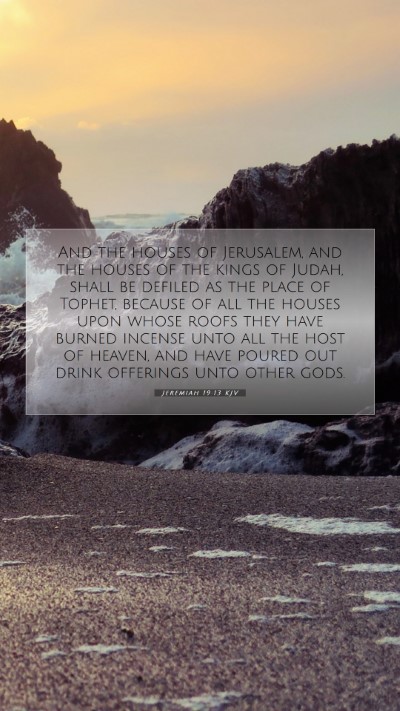Understanding Jeremiah 19:13
Jeremiah 19:13 states: "And the houses of Jerusalem, and the houses of the kings of Judah, shall be defiled as the place of Tophet, because of all the houses upon whose roofs they have burned incense unto all the host of heaven, and have poured out drink offerings unto other gods." This verse signifies a profound warning about the consequences of idolatry and the defilement of sacred spaces.
Summary of Biblical Meaning
This verse provides a vivid illustration of the destruction that comes from turning away from God towards false worship. It references Tophet, a place associated with the horrific practice of child sacrifice, indicating the severity of Jerusalem’s sin.
Bible Verse Explanations
- Context of Idolatry: The worshippers of foreign gods, particularly in high places, engaged in practices that desecrated their own homes and the very city that was meant to be a beacon of God’s holiness.
- Symbolic Defilement: The reference to houses being defiled suggests that sin has consequences that affect not just the individual, but also the community and the integrity of their worship and sacred spaces.
- Judgment Pronounced: This verse is a part of Jeremiah's prophecy which brings forth God’s judgment upon Judah for their idolatrous practices, employing strong, graphic language to emphasize the seriousness of their offenses.
Bible Verse Commentary
According to Matthew Henry, this passage serves as a poignant reminder that God’s patience has limits; He will not allow persistent sin to go unpunished forever. He underscores that the holiness of Jerusalem was compromised by its inhabitants’ infidelity.
Albert Barnes adds that the reference to incense burned to the "host of heaven" indicates the widespread nature of this idolatry, showing how deeply ingrained these practices had become in the lives of the people.
Adam Clarke notes that the mention of drink offerings points to the old worship practices that the Israelites had adopted from their pagan neighbors, leading them astray from the true worship of Yahweh.
In-Depth Bible Verse Analysis
To fully grasp the significance of Jeremiah 19:13, it is crucial to understand the historical and cultural backdrop of ancient Judah. The worship of celestial bodies and gods from neighboring nations reflected a significant spiritual decline.
- Historical Context: This period was marked by a series of kings who often promoted idolatry, leading the people away from their covenant relationship with God.
- Cultural Practices: The inclusion of pagan practices such as child sacrifice and burning incense on rooftops illustrated a perversion of faith and worship that was meant to be directed solely toward Yahweh.
Significance of This Verse
The theological implications of Jeremiah's message are profound. This warning exemplifies God's righteousness and the expectation that His people remain devoted to Him. The consequences of straying include not only personal repercussions but also communal fallout, affecting the very heart of their society.
Application of Scripture to Daily Life
In a modern context, this verse invites reflection on what elements of idolatry may exist today. Are there practices and values that draw one away from a true relationship with God?
- Identifying Modern Idols: Individuals can assess whether they prioritize activities or possessions over their relationship with God.
- Community Accountability: Just as the sin of individuals led to communal defilement, so too does our collective spiritual health depend on accountability and community worship.
Bible Study Insights
This verse can serve as a pivotal discussion point for bible study groups looking to explore themes of sin, judgment, and grace.
- Discussion Questions: What does it mean to have a pure heart before God? How do we guard our hearts against modern idols?
- Bible Study Tools: Utilizing commentaries and study guides can enhance understanding, providing historical and contextual insights that deepen the analysis.
Cross References
- 2 Kings 23:10: Addresses reform attempts by King Josiah in eliminating child sacrifice.
- Jeremiah 7:31: Further outlines the sins committed by the people, including the worship of false gods.
- Isaiah 65:3-4: Critiques the idolatry and unfaithfulness of Israel in showing the extent of their betrayal of God.
Conclusion
Jeremiah 19:13 serves as a powerful reminder of the importance of fidelity to God and the dire consequences of turning away from His commandments. The defilement of sacred spaces highlights the communal impact of personal sin and the need for repentance and restoration.


